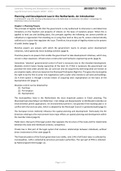Summary: Planning and Development Law in the Netherlands
Legal & Governance Aspects (2020 – 2021)
Planning and Development Law in the Netherlands. An Introduction
F.A.M Hobma & P. Jong. (201). Planning and Development Law in the Netherlands. An Introduction. (1st edition). ’s-Gravenhage, the
Netherlands: Instituut voor Bouwrecht.
Chapter 1: Planning Powers
The principle of legality holds that the government is only authorised to intervene in and determine
limitations on the freedom and property of citizens on the basis of statutory power. When this is
applied to land use and building plans, this principle signifies the following: we cannot prohibit an
individual or organisation from building on or using their land as they see fit, unless a democratically
ratified act is in place that regulates the issue. Therefore, the principle of legality relates to the powers
of public bodies (page 3).
Reactive powers are powers with which the government reacts to private sector development
initiatives, which generally mean building activities (page 4).
Proactive powers are powers that enable the government to take development initiatives, which may
concern urban expansion, infrastructure construction and hydraulic engineering works (page 4).
Sometimes ‘absolute’ governmental control of land is necessary due to the intended development.
Absolute control means having ownership of the land. (1) If that is necessary the government can
purchase the land under private law. (2) Land can also be acquired by exercising what are known as
pre-emption rights, which are based on the Municipal PreEmption Right Act. This gives the municipality
the right to be the first to enter into negotiations with a seller who intends to sell land and buildings.
(3) A third option is through a forced means of acquiring land: expropriation on the basis of the
Expropriation Act (page 5).
Absolute control can be obtained by:
(1) Purchase
(2) Pre-emption
(3) Expropriation
The municipalities have in the Netherlands the most important powers in Dutch planning. The
Municipal Executive (Mayor and Alderman = het college van Burgemeester en Wethouders) decides on
environmental permit applications. An environmental permit is not granted if the building plan is in
conflict with the land-use plan, which is adopted by the Municipal Council (= gemeenteraad) (page 6).
The European Union indirectly influence the spatial planning and development. Particularly the EU
directives relating to the environment have major effects on spatial planning and development within
the member states (page 8).
Public law is that part of the legal system that regulates the structure of the state and the relationship
between the state and individuals (citizens, companies).
Private law is that part of the legal system that involves relationships between individuals, without
direct involvement of the state (page 9).
The financial powers of the Dutch government are visible, only 3,4% of all Dutch taxes is collected by
municipalities. 1,6% is collected by provinces and water authorities. The vast part of 95% is collected
by National government (page 11).
Page 1 of 7
, Summary: Planning and Development Law in the Netherlands
Legal & Governance Aspects (2020 – 2021)
Chapter 2: Planning and Property Rights
A land-use plan does not take away the property of the owner. Nor does the land-use plan infringe on
the owner’s exclusive right of use of his property. This differs essentially from expropriation. In
expropriation the property is taken away from the owner (page 15).
Land-use plans can constitute a limitation of a landowner’s property rights. In short, a land-use plan
determines what can be built where and which regulations (such as maximum heights) apply to it.
Landowners may, under certain conditions, be eligible for planning compensation (page 18).
The following ingredients of the right of planning compensation (article 6.1) can be deducted from this
article:
(a) Direct and indirect damage
(b) Capital and income losses
(c) Several planning decisions
(d) Irrevocability
(e) No complete compensation
(f) Monetary or in kind compensation
The pre-emption right is not confined to transfer of land (and buildings on it). It also applies to (limited)
user’s rights such as ground lease. The ground lease, for example, is not free to transfer his right of
lease to others than the municipality once the pre-emption right is in force (page 23).
The establishment of the pre-emption right does not imply that the owner has to sell his lead to the
municipality. It just means that, if he is willing to sell, he has to offer it to the municipality and cannot
offer it to another party (page 23).
Expropriation is the extreme form of limitation of property rights. In fact, expropriation means that
property is taken away from the owner (page 24). Expropriation is initiated by a governmental body,
but every expropriation case is brought before a civil (district) court. The court determines the
soundness of expropriation claims and sets the compensation that must be paid by the governmental
body to the expropriated party (page 25). Expropriation is only allowed after negotiations between
municipality and owner failed to result in an amicably agreement to sell the property (page 26).
“The one who owns the land, will build”; The self-realisation principle expresses the owner’s right to
develop land. The principle holds that if a party, such as a property developer, is able to realise (part
of) the land-use plan and is willing to do so in the same way the municipality wants to, his land cannot
be expropriated. This principle has emerged from case law based on the Expropriation Act (page 28).
Chapter 3: The Environmental Permit
The principle of a permit system is that something is not permitted, unless otherwise indicated by the
authorities. In the Netherland, building is not permitted unless an environmental permit has been
granted by the Municipal Executive under article 2.1, paragraph 1, under a, Environmental Licensing
Act (page 33).
In essence, the environmental permit regulates the testing of a design for a structure against criteria
related to:
- Urban planning
- Technical soundness and safety
- Aesthetics
- Health and environment (to a certain extent)
Page 2 of 7





